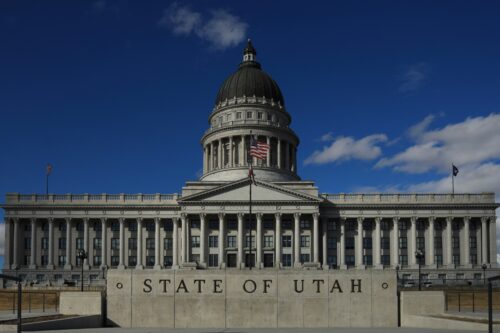“With the Digital Choice Act, we’re giving people the power to take their content, connections, and data wherever they choose. This is how we build a better online future.” – Governor Cox, Utah
Today’s social media ecosystem has a major power imbalance. Technology companies often prioritize profits over people, despite concerns shared across the political spectrum about privacy violations, mental health impacts, and children’s online safety issues. Their control over our personal data and digital lives traps us in “walled gardens” which are designed to make leaving the platform extremely difficult. However, promising new legislation offers hope for turning the tides on the social media landscape. The Utah Digital Choice Act (HB418), signed into law in March 2025 with bipartisan support (64-1 House), enables users to have more ownership over their data and reshapes platform incentives. The law is set to take effect on July 1, 2026.
Below, we’ll explore what the Digital Choice Act does and what it might mean for the future of social media.
The Problem
Current social media platforms collect a vast amount of personal data including posts, photos, messages, location, browsing habits, shopping behavior, activity (often including how long you view a post), device information, contacts, payment information and more, that users are often unaware of. This data has real value, but we often have little control over how it is collected, used, sold, or transferred. These platforms hold our data captive to keep us locked in to their service, and use our data to create detailed profiles on us for targeted advertising. Users might want to switch or exit platforms for a variety of reasons such as moving to a better service or not wanting their, or their childrens, online behavior tracked. Making the “switching costs” high for users has been an intentional part of these platforms’ strategy, with several examples coming out in previous antitrust complaints from FTC investigations.
Our personal data can also be lost, or at risk, when these platforms disappear. For example, Google has shut down several services used by millions of users, and there is ongoing concern over personal genetic data with the bankruptcy of 23andMe. These cases highlight pain points of not being able to fully access and transfer the personal data trapped on these platforms today.
What the Digital Choice Act Does
HB418 both amends the Utah Consumer Privacy Act and enacts the Digital Choice Act. The Utah Consumer Privacy Act already allows users to request the deletion of the personal data (e.g. personal information, posts, photos) that they provided to the platform. Now with the amendment in HB418, a user is also able to correct an inaccuracy in their personal data profile if a platform has the wrong information (e.g. name, location). The Digital Choice Act, which HB418 enacts, is a particularly significant change because it mandates that social media companies operating within Utah implement data portability and interoperability practices.
Data portability is the ability of a user to receive their personal data, for example by downloading it in a format that would be transferable to other platforms. This could include friends or connections, comments, photos, likes, and their social graph on the platform that a user would want to take with them. One existing example of data portability is the ability to move telephone numbers from one provider to another, which was mandated by the Telecommunications Act of 1966.
The Utah Digital Choice Act mandates portability practices for your personal data and social graph. This Act uses the definition of personal data as “information that is linked or reasonably linkable to an identified individual or an identifiable individual”, but does not include deidentified, aggregated, or derived data that a social media company has generated internally, or other proprietary algorithms or ranking systems. The social graph is defined as “data that represents a person’s connections and interactions with a social media service” which includes social connections, content, responses to other users’ content, and certain metadata, but does not include any private content and responses.
Data interoperability refers to how different platforms work together, such as being able to take your data from one platform and upload it to another. In the physical world, interoperability might look like an outlet or USB-C, an agreed upon standard that allows different tools to work together. In the digital world, this kind of pattern exists with email services– users can communicate across different services (such as Gmail and Outlook) because they use the same protocol to exchange information.
Taken together, data portability and interoperability empower individuals to own their own data and to choose where to take it and how to use it, allowing them to maintain consistency across platforms. Rather than having to start from scratch and losing years of their social media presence, users could transfer their connections, content, and history, and upload them to an alternative platform. Reducing this friction for users to move to a potentially better product encourages competition and reshapes incentives, giving smaller players a real chance over incumbents.
What Comes Next
Now that the Act has been passed, one challenge will be figuring out how social media companies should implement these portability and interoperability requirements in practice. Some companies have already started working on tools for data portability such as Google Takeout and Facebook’s data transfer tools. While these are incomplete, and don’t include your social graph, which HB418 requires, they demonstrate how this type of information transfer could be possible. The Utah Digital Choice Act doesn’t mandate any particular protocol for interoperability, but it does state that it must be transparent, open, and third-party accessible (i.e. “a person other than the consumer, controller, or processor”, or their affiliates). Some examples of open protocols that exist today are ActivityPub which is used by Facebook Threads and Mastodon, DSNP, the AT Protocol which is used by Bluesky.
At a federal level, the bipartisan ACCESS Act, also targeting data portability and interoperability between major social media platforms, has been introduced multiple times but has remained stalled in Congress. But what happens in Utah with HB418 might set a precedent for other states to follow. Representative Doug Fiefia, who sponsored HB418, has mentioned that several other states are interested.
The Utah Digital Choice Act is one of the most promising, bipartisan efforts to truly reform the social media ecosystem by giving users more choice and ownership over their personal data, while encouraging platform innovation and competition.
Additional Resources:
Sarah Hubbard, former Technology & Public Purpose Fellow at the Belfer Center under Secretary Ash Carter, is the Associate Director for Technology & Democracy at the Ash Center’s Allen Lab for Democracy Renovation.
The views expressed in this article are those of the author alone and do not necessarily represent the positions of the Ash Center or its affiliates.




